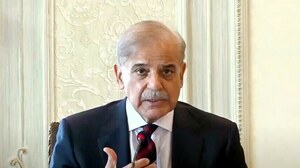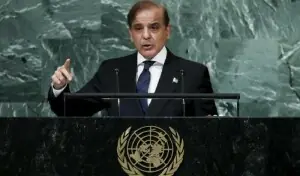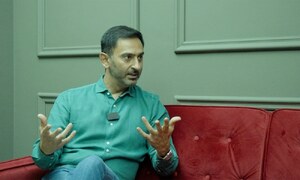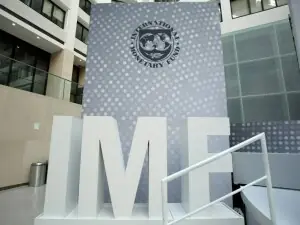Dr Mukhtar Ahmed is serving as the Chairman of the Higher Education Commission, which oversees higher education institutions (HEIs) in Pakistan. Dr Mukhtar has over 25 years of experience in the education sector. He has previously served as the Executive Director, HEC, prior to which he was the Deputy Director General of the Islamic Educational, Scientific and Cultural Organisation in Rabat, Morocco. Dr Mukhtar earned Bachelor & Master of Science from University of Agriculture, Faisalabad and Master in Business Administration and his PhD in Botany from University of California, Riverside, USA.
Following are selected excerpts from the HEC Chairman's recent conversation with BR Research in Islamabad:
BR Research: What are your plans for the HEC?
Dr Mukhtar Ahmed: Firstly, we will strive to achieve a better tertiary enrolment rate than the current 8 percent. We are on track and regular financial allocations will help. Secondly, my objective is to spread HEIs to communities as far as Turbat and Fata, because higher education's spillover effects are huge for families and communities living in remote areas relative to urban areas. Government has been kind enough to support our plan to open either a campus or a university in each district across Pakistan in next four years. This expansion will impart only quality education with proper faculty.
Thirdly, we will convert each university into a "smart university", whereby students, using smart devices and Wi-Fi connectivity, will be able to access digital resources without the hassle of building and maintaining brick and mortar computer laboratories. Fourthly, we are pushing a handholding project where comparatively better universities will share their experiences and expertise with the schools, colleges, and even small universities within their areas. Fifth, we will further improve our focus on quality faculty. In the last few years, when HEC itself was in crisis, some HEIs went into a lax mode and loosened their standards.
And sixth is the role-definition for higher education bodies. HEC's status post-18th Amendment is still a sensitive issue and remains unsettled. My position is that HEC cannot have an ON or OFF switch. Now Sindh and Punjab have made higher education laws that are incompatible with each other. That is a nightmare for harmony in degree award, accreditation, etc.
BRR: What is your proposal for a nationally-consistent higher-education supervision regime?
MA: We need to go for a transformative process where we need to learn the lessons of the last 12 years. We need to sit together and do the consultation. Provinces should make their own councils - we do not dispute that. But higher education policies should be made at the federal level, and implementation can be at the provincial level. Degree recognition, quality standards, and research direction are issues that must remain centralised. I have requested the government to have consultation for a structure that has defined roles for federation and provinces. Provinces must be members of the HEC and take part in all the policies.
BRR: A lot of students want to know what the HEC is doing to improve the university ranking system.
MA: We are soon going to release the new rankings. We will place the whole methodology on the HEC Website, so that the process is open and transparent. We are thinking to add a few more indicators to the rankings. For instance, how a university integrates with society will also figure in future rankings. That's because HEC will now be pushing for universities towards social outreach, so that academia is beneficial to the society. We are soon going to introduce a compulsory course which will address issues of values, ethics and social entrepreneurship. Each student will be required to serve the society in a social domain.
BRR: There are questions over quality of research being producing by Pakistani universities. Do you recognise that there's a problem? If yes, how will you address that?
MA: HEC only recognises good, quality research that is judged by peers and journals and is published in impact factor journals. There are issues, I agree, but we have to understand a few things. The universities' role is both imparting knowledge and creating knowledge. Knowledge creation has two levels: basic research and applied research. In Pakistan, HEIs are doing both basic and applied research. But meager resources are being put into research. More resources need to be put into research.
What is important is that over the last 12 years, a research culture has emerged among a large number of local universities. Initially, the task was to do just research, because the research-base was almost non-existent. So, research was linked to promotion and performance evaluation, and that's also the major reason why it took off. But I think the time has come to be selective about research. Professors are already balancing themselves between teaching and research. We are only recognising journals which have impact. Then we are cracking down hard on plagiarism. All universities have that plagiarism-counter software.
But I am thinking beyond that: what about impact of research in the country and society? That's why we are introducing inter-disciplinary, problem-based research. "From impact factor to impact" is how I frame the issue. Publishing a dozen papers is great, but that alone is not enough. The research has to be high quality and it has to make an impact on the society.
BRR: But the existing bottom-up PhD hiring alone may not work for inter-disciplinary research. You may need to hire top quality professors from abroad rather than only send local talent abroad to get their PhDs.
MA: Both top-down and bottom-up PhD hiring has been under way in Pakistan. HEC has now completed seven years of foreign faculty hiring programme where we brought in a lot of Pakistanis and non-Pakistanis, regardless of gender, to teach in Pakistani HEIs. We provided them good incentives and they have delivered. For instance, the Abdus Salam Center for Mathematics in Lahore is a result of foreign faculty hiring, and many experienced professors were hired in Islamic International University and Quaid-e-Azam University.
The programme really helped to push the research culture in the HEIs. This faculty helped us introduced the patent system and many new centers. These people also helped to create global linkages for us with their alma maters. But the problems are so huge in our country that it will take more inputs and more time to be really able to show the change. Back when HEC was formed, only 2.6 percent of university-eligible candidates were entering the university system. Now that number has improved to 8 percent. But that's just one million out of the 25 million youth that should be in universities. India has 20+ percent tertiary enrolment rate and Bangladesh 14 percent. We have a long way to go.
BRR: How many more PhDs does Pakistan need for its higher education sector?
MA: In competitive systems, no one can teach in a university unless they are a PhD. But in Pakistan, only about a quarter of 40,000 university teachers are PhDs! And this ratio will fall, as we open more institutions but not enough PhDs to recruit. We realise the nature of the challenge. That is why more than 45 percent of HEC PSDP has gone to human resource development: mostly scholarships abroad and local. Only about 38 percent of PSDP has been in bricks and mortar development, eg university complexes.
But we must also know that what Pakistan is spending on it HEIs is equal to just one world-class Western university: It's peanuts, and then people want impact today. I am saying that it will take time and many more inputs. We need to have serious investments in higher education. We need to first create a critical mass for faculty, governance and research. Only then can the natural process go towards delivery, where we can provide pure local solutions to indigenous problems.
But I must stress that things are moving in the right direction; very good things are happening. But we cannot isolate HEIs from the ills found in the society. This sector also has the fraud, leg-pulling and other ills of the society. But it shouldn't be that way. This sector must give hope to the society. That is why we want to open up the universities so that the students and faculties can go out and do outreach. We have asked HEIs to open outreach offices to have interactive sessions with local neighbourhoods. There should be a dialogue on basic issues such as hygiene, tolerance, water management, energy usage, etc.
BRR: Why, has the HEC not been selective about choosing PhD subjects in which the country is facing acute issues, eg energy efficiency, water management, criminal sciences, forensic testing, etc?
MA: When HEC was formed, there was a huge gap in the university system and not many PhDs were there. It was decided then that on open merit, top students will be sent for PhDs on subjects of their choice. HEC could not be picky and choosy at that time because there was no strong PhD-base existent at that time. We needed PhDs in nearly every field. Now fifteen years later, we still need 40,000 PhDs.
Can we be selective about our PhD funding today? Yes, to some extent. We are now giving priority to subjects which have been neglected in the past. Now we need to balance the resource towards other areas. We have identified three key issues where HEC can play its role in the national context: Energy, Water and Food Security. These issues are linked with each other. A Pakistani university consortium will soon be working with a US university consortium to develop human resource base in these areas. We have already picked universities for all three areas, and Center for Advanced Studies, have already been commissioned.
Planning Commission has even asked the HEC to give an estimate of how many PhDs are needed in Pakistan and in how many areas. From here on, PhD scholarships will be more selective: selected people for selected fields.
BRR: How about nudging the universities towards setting up inter-disciplinary schools? For instance, new disciplines such as behavioural economics can help Pakistan build a regional cluster.
MA: Similar to what you are suggesting has already been undertaken by the HEC. Universities have established Offices for Research, Innovation and Commercialisation (ORICs) upon HEC's insistence and funding. More than 80 ORICs have been set up so far. An ORIC is a hub that will create a conducive research environment. These offices also co-ordinate among various disciplines and do research. We are already seeing results from institutes like Nust and the Agriculture University, Faisalabad.
As far as the Behavioural Economics field is concerned, we have to understand that most of the time; the choice of discipline is usually triggered by the market forces. In a country like Pakistan where students are getting enrolled into universities to get jobs, that trigger is very influential.
BR100
16,405
Increased By
92.5 (0.57%)
BR30
52,938
Increased By
579.1 (1.11%)
KSE100
158,781
Increased By
743.5 (0.47%)
KSE30
48,500
Increased By
249 (0.52%)





















Comments
Comments are closed.